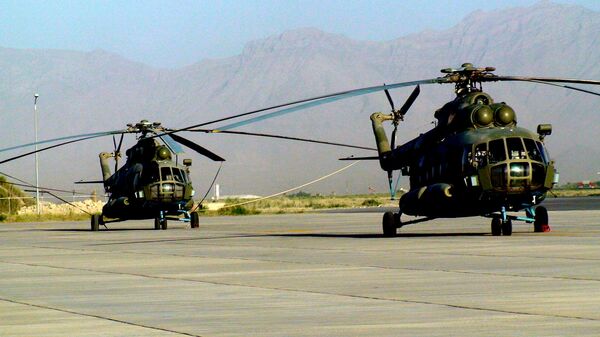MOSCOW, August 9 (RIA Novosti) - Congressmen are criticizing Pentagon officials for maintaining contracts with Rosoboronexport, Russian arms exporter, that is supplying Mi-17 helicopters to the US-backed Afghanistan army.
"Particularly after Vladimir Putin's recent behavior, we should not be filling the coffers of Russian arms dealers," said Rep. Rosa DeLauro, a Connecticut congresswoman, cited by CBS News. In the wake of increased tensions between Russia and the US, the Pentagon should cancel its deal with Moscow, American lawmakers insist.
Pentagon argues that the cancellation of the contract would be a "catastrophic" blow to the ability of Afghan forces to carry out counterterrorist operations.
"The reason I use the word catastrophic, which I don't think is hyperbole, is because the inability of the Afghans to have the operational reach represented by the Mi-17 will seriously deteriorate their ability to take the fight to the enemy," claimed Marine Gen. Joseph Dunford, quoted by the Stars and Stripes, "But the more important reason I use the word catastrophic is their inability to take the fight to the enemy will actually put young Americans in harm’s way in 2015 and beyond."
“One of the reasons the Afghans like the Russian helicopters is that Russian helicopters are a bit more forgiving in austere environments,” claims Christopher Harmer, a former US Navy helicopter pilot and a senior naval analyst with the Institute for the Study of War, as cited by the Economic Times.
The Russian Mi-17 helicopter "is best suited for Afghanistan's rugged terrain and thin altitude and less work for Afghans to keep running than rival-US made systems," insists the US Defense Department, as cited by The Hill. It should be noted that the Pentagon has already purchased 88 Mi-17 helicopters for its Afghan Air Force.
It's not the first time the joint program of the Pentagon and Rosoboronexport, Russia's arm exporter, sparks controversy among the American lawmakers. About a year ago the Associated Press reported of a heated debate provoked by the contract in the US Congress. Senators claimed the Pentagon should block the deal because of the fact that Russia had sold advanced weaponry to Syria and Iran, sheltered Edward Snowden and criticized the US State Department for violating human rights. According to lawmakers, the Pentagon had to replace Russian helicopters with American choppers, particularly Boeing's Chinook or the UH-60 Blackhawk, made by Sikorsky.
The Pentagon had also been resisting the lawmakers' attacks on its collaboration with Rosoboronexport during 2009-2012, when the United States supplied its forces in Iraq, Afghanistan and Pakistan with Russian helicopters.
"Particularly in light of the great commitment the United States is making to Afghanistan, rather than procuring Russian helicopters with unclear reliability and cost, we believe it is only prudent to consider proposals from US manufacturers, employing American workers, with a history of providing the Defense Department with the best equipment at the best value to the US taxpayer," stated six Connecticut congressmen in a letter to the Pentagon written in 2010, according to The Center of Public Integrity, the US investigative news organization.
It's worth mentioning that the headquarters of Sikorsky Aircraft Corp., one of the biggest US helicopter manufactures is also located in Connecticut.
"The push to end the Russian helicopter deal has been led by many lawmakers whose states house rival firms that hope to supply the Afghan military," notes The Hill in an article titled "Russian arms deal divides Congress," published in July, 2014. Amid the increasing radical Islamists activity in the Middle East and Asia, the American military lobby interests should not be placed above the global security issues, experts note.

